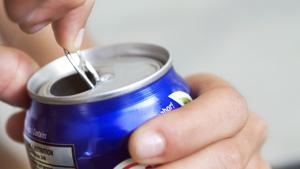
Cami Wells Energy drinks are heavily marketed and claim to boost energy levels and improve mental focus. Following multivitamins, these beverages rank as the second most popular dietary supplement among American teenagers and young adults. As reported by the National Center for Complementary and Integrative Medicine, males aged 18 to 34 are the highest consumers of energy drinks, while nearly one-third of teens aged 12 to 17 consume them regularly.
The American Academy of Pediatrics advises against energy drink consumption for children and adolescents. Energy drinks are typically found in two different types of products. One is sold in containers similar in size to those of ordinary soft drinks.

The other kind is sold in small containers holding 2 to 2-1/2 ounces of concentrated liquid and are commonly referred to as called “energy shots.” Caffeine is a major ingredient in both types of energy drink products — at levels of 70 to 240 mg in a 16-ounvr drink and 113 to 200 mg in an energy shot. For comparison, a 12-ounvr can of cola contains about 35 mg of caffeine, and an 8-ounvr cup of coffee contains about 100 mg.
Energy drinks also typically contain other ingredients such as guarana (another source of caffeine sometimes called Brazilian cocoa), sugars, taurine, ginseng, B vitamins, glucuronolactone, and bitter orange. The amounts of caffeine in energy drinks vary widely, and the actual caffeine content may not be identified easily. Some energy drinks are marketed as beverages and others as dietary supplements.
There is no requirement to declare the amount of caffeine on the label of either type of product, but many have it listed somewhere on the packaging. A growing body of research shows that energy drinks can have serious health effects, particularly in children, teenagers and young adults. Large amounts of caffeine may cause serious heart and blood vessel problems such as heart rhythm disturbances and increases in heart rate and blood pressure.
Caffeine also may harm children’s still-developing cardiovascular and nervous systems. Additional concerns include: Caffeine use may also be associated with anxiety, sleep problems, digestive problems and dehydration. People who combine caffeinated drinks with alcohol may not be able to tell how intoxicated they are; they may feel less intoxicated than they would if they had not consumed caffeine, but their motor coordination and reaction time may be just as impaired.
Excessive energy drink consumption may disrupt teens’ sleep patterns and may be associated with increased risk-taking behavior. A single 16-ouncr container of an energy drink may contain 54 to 62 grams of added sugar; this exceeds the maximum amount of added sugars recommended for an entire day. Chocolate Cherry Smoothie 1⁄2 cup non-fat milk 6 ounces non-fat plain or vanilla yogurt 2 tablespoons dark chocolate chips 1 cup frozen dark cherries Wash hands with soap and water.
Place milk, yogurt, chocolate chips and frozen cherries in a blender or food processor. Blend until smooth. Store leftovers in a sealed container in the refrigerator for up to four days.
Makes 2 servings. Nutrition information per serving ( 1⁄2 of recipe): Calories 180, total fat 5g, saturated fat 3.5g, cholesterol 5mg, sodium 60mg, total carbohydrates 29g, fiber 3g, 24g sugar, includes 5g added sugars, protein 8g.
.















